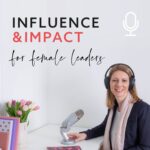Are you an overthinker? Perhaps you ruminate on past situations, worry about future events or are fearful of the judgement of others?
This re-release of one of my most popular podcasts with Tahirih McLaren-Brown is for you.
Overthinking can affect both our work and personal lives as well as how we show up with confidence as a leader. Our thoughts also directly impact the levels of daily stress we experience and how quickly we can recover from it.
We discussed:
- What mindfulness is and how it can benefit you
- How you can have more awareness and control of your thoughts and emotions
- What you can do if you’re feeling worried or anxious about returning to the office
- Ways you can handle uncertainty and even embrace it
- A quick mindfulness exercise you can do anywhere to instantly ease your stress
If you’d like to learn the Four Step Pause that Tahirih shared and get access to seven days of guided meditations for overthinkers, you can find those here: https://tahirih-mclaren-brown.newzenler.com/courses/free-mindfulness-kit
JOIN THE BOOK LAUNCH SQUAD
My book – “Closing the Influence Gap: A practical guide for women leaders who want to be heard” – is launching on Monday 19 September. I would love you to be part of my Book Launch Squad, get the book on the Amazon best-sellers list and get free access to my new career development community!
To join the Book Launch Squad, all you need to do is sign up at the link below and then on Monday 19 September, buy the book on Kindle for the special price of 99p and share it with as many people as possible.
Join the Book Launch Squad here: www.carlamillertraining.com/launchsquad
MORE ABOUT THE CAREER DEVELOPMENT COMMUNITY
The career development community I’m creating for women is almost ready to pilot. My aim is for it to be an all-in-one solution for female talent development from early careers to senior leaders. To start with it will be a brilliant library of career development resources combined with an online community and spaces for women to come together and support each other.
I will be running a free beta version from 1 October – 31 December 2022 to build the community and refine the idea. To be part of it, you just need to pre-order my book and send a copy of your receipt to hello@carlamiller.co.uk with the subject line “Pre-Order”, or join my launch book squad!
Pre-Order Closing the Influence Gap: A practical guide for women leaders who want to be heard: https://www.amazon.co.uk/Closing-Influence-Gap-practical-leaders/dp/1788603613/ref=sr_1_1?crid=32SFPA2L60FCM&keywords=closing+the+influence+gap&qid=1649087866&sprefix=closing+the+influence+gap%2Caps%2C91&sr=8-1
BE BOLDER
Increase your confidence and assertiveness at work in Be Bolder, my 4 session course for women.
Learn how to set healthy boundaries, say no more often, speak up more confidently in meetings, worry less about what others think of you, have the courage to have challenging conversations and be more assertive in your communication.
Each weekly session is delivered as a 90-minute online workshop with bite sized videos and coaching exercises to do between sessions. Our next cohort starts on Wednesday 5 October.
Find out more here: https://www.carlamillertraining.com/be-bolder
CONNECT WITH ME:
LinkedIn: https://www.linkedin.com/in/carlamiller1/
Instagram: https://www.instagram.com/thisiscarlamiller/
HOW CAN I SUPPORT THE PODCAST?
Subscribe
Share this episode with a friend
Leave a review on Apple Podcasts or Spotify
I would love to hear your feedback on this week’s podcast. Please leave a review or come say hello on social!
Thank you for listening, see you next week!
WORK WITH ME:
If you’d like to talk to me about working together do book a call.
How I work with individuals:
- 1:1 executive coaching
- Be Bolder confidence and assertiveness course
- Influence & Impact women’s leadership programme
How I work with organisations:
